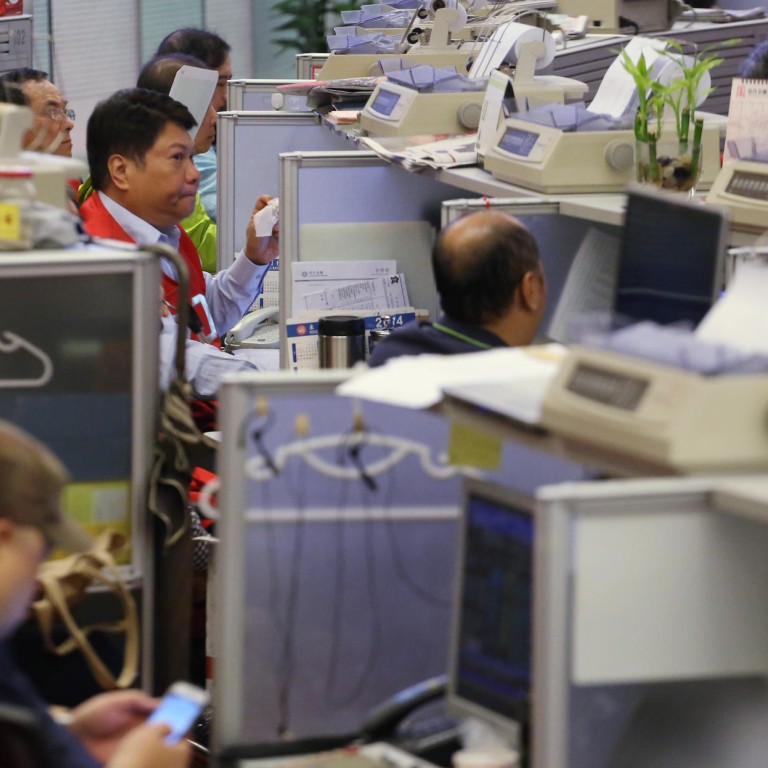
HKEx should focus on commodities, boosting trading ties with China, say analysts
Local bourse should focus on products that appeal to Chinese retail investors and further expand commodities trading in 2015, say analysts
Hong Kong Exchanges and Clearing should strengthen trading connections with the mainland this year and further develop commodities trading, say analysts. They also urged HKEx to adopt measures from other exchanges to help boost turnover and attract more new listings.
Following the launch of the stock connect scheme in November that enabled cross-border stock trading between the HKEx and Shanghai Stock Exchange, the next step would be to explore other trading connections that suit the taste of mainland investors.
"HKEx should focus on products which particularly appeal to mainland retail investors based on their preferences and risk profiles," said Sitao Xu, chief economist at Deloitte China.
"Mainland investors may prefer growth-oriented products and sectors that are not available on the Shanghai Stock Exchange. [They] may also want to have access to other asset classes that are beyond the stocks within the domain of Shanghai-Hong Kong Stock Connect," Xu said.
Ben Kwong Man-bun, a director of KGI Asia, also expects the local bourse to engage in more cross-border trading schemes with the mainland this year.
"After Shanghai, it would be natural to see the HKEx link its stock market with the Shenzhen Stock Exchange. It could also consider a tie up between the Hong Kong and mainland markets involving other asset classes such as bonds, commodities and futures," Kwong said.
Hong Kong Investment Funds Association chairman Bruno Lee said a bond through-train scheme for institutional investors would enhance competitiveness of the local bourse and strengthen its role as an international yuan trading centre.
"Many institutional investors would like to invest in the mainland bond market but [they] don't have the QFII (qualified foreign institutional investors) quota," he said.
Keith Pogson, a senior partner with accounting firm EY, said listing reform would be the focus of the HKEx this year. In November it completed a three-month consultation on whether to amend listing rules to allow dual share structures. This was prompted when mainland e-commerce giant Alibaba Group decided to list in the US after Hong Kong refused to accommodate its request to allow Alibaba founders and key executives to nominate a majority of the board even though they held minority stakes.
"It is likely we will see some progress on this topic, with a likely suggestion of a relaxation of the rules," Pogson said. "Hong Kong has great corporate governance safeguards in place. It is only a small step in terms of allowing the structures, versus a substantial competitive barrier for the HKEx being removed."
Pogson expects the exchange will expand into more commodities and other types of yuan products this year. The HKEx last month introduced yuan denominated metal contracts in zinc, copper and aluminium, marking its first move to expand commodities trading since its takeover of the London Metal Exchange in 2012.
Brett McGonegal, chief executive of financial services firm Reorient Group, believes the exchange should lobby the Hong Kong government to reduce the stamp duty to boost turnover.
"HKEx has the highest trading cost of the mature markets and this trading cost limits the involvement of most computer-driven trading," McGonegal said. The high cost is mainly because the government charges 0.1 per cent stamp duty per trade while many other markets have removed it.
"A decrease in stamp duty and tax would result in a positive multiplier effect on turnover … resulting in more liquidity which, in turn, drives larger players into the market," he said.
For example, dual listed casino operator Wynn's turnover is around US$270 million a day on Nasdaq compared with only US$20 million a day on HKEx.
"This dynamic has led many international investors into liquidity traps that ultimately decrease their confidence in deploying large amounts of capital in Hong Kong," McGonegal said.
He also called on the HKEx to re-implement the closing auction system used in most countries to establish closing prices.
Hong Kong adopted the system in May 2008 but suspended it 10 months later after a huge swing in the share price of HSBC.
"All major markets have closing auctions that allow people to access a single closing price," McGonegal said. "Without it, many options players are left in a quandary as their deltas are priced on the closing price but they have no efficient way to access that close."

